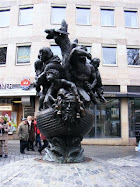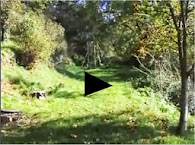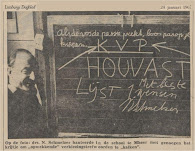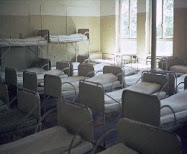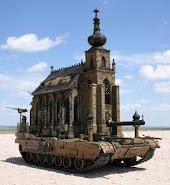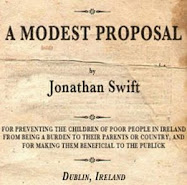It’s Father’s Day today. In our family, we’ve always called it Daddy’s Day. There’s a fridge magnet on my father’s fridge that says, “Anyone can be a father. It takes someone special to be a Daddy.” My brother, sister and I always called my father “Daddy.” It was one of the ways we tried to communicate to him how much we loved him and how precious he was to us. For me, it was my way of reminding him that I treasured every minute of my life with him, and still loved him as unreservedly and completely in adulthood as I did when I was a little girl and he was the brightest light in my life. I loved Daddy’s Day so much. It was the only day of the year that my father didn’t make a fuss about being given anything or tell his kids that we shouldn’t have spent any money on him.
My father’s life was not easy. It was never going to be. The damage done was too great. He woke every day of his life in terror thinking he was still in the Alkira / Indooroopilly Salvation Army Boys’ Home. He told me about this around eight years ago. I tried to break whatever terrible loop was still going on his mind decades after his abuse by being ready at the prearranged time every day for the seven years I lived with him with a cup of coffee, a knock on his door, and the most cheerful “Hey Daddy, would you like a cup of coffee?” I could muster. I didn’t know what else to do. It was futile, but it was something.
The day before my father died, the television crew from the ABC had come up and filmed and interviewed him. My father was ecstatic when they’d left. He had lost hope that he’d ever achieve justice from the Salvation Army. His hope had sprung anew. He believed, and he was right to do so, that the Salvation Army only ever did anything remotely good for people when its reputation (and thereby its money) were at stake – when people were watching. He felt that with the spotlight on the organisation once more, there was a chance again at real justice. And not just for him, but for all the Home Boys, and all the others. These things flow on, he said. If he could achieve proper compensation, he’d shout it from the rooftops, whether or not he signed a confidentiality agreement (“Let the bastards try and sue me – they couldn’t!” he said one night), and all the other institutions (and government) would have to follow suit, or be seen to be left behind. We bought a bottle of non-alcoholic wine at the IGA, ready for the day we’d crack it open and celebrate.
He wanted $3.3 million from the Salvation Army. $100,000 for each year of the 33 years he was unable to work due to profound disability emanating from the multiple traumas he experienced at Alkira. I’d spent quite a few years talking with my father about his low expectations and low self-esteem. I only ever approached the topic gently, primarily because I didn’t want him to have a new thing to feel badly about himself and also because although we had a fairly frank way of speaking with each other, there’s only so far I felt it appropriate for a daughter to speak to a father about his way of looking at the world. I backed away completely from the topic after one bad day when he told me how stupid he felt at having signed away his rights to go after the Salvation Army for a mere $30,000 – approximately $1,000 for each year in which he was unable to work – around $3/day.
When he told me weeks before he died that he was going to go back to the Salvation Army again and demand the justice he truly deserved, I was pretty ecstatic too. I’d suspected he might say this after all the posts he’d been writing about the Salvation Army, but it was still a great surprise, and a happy one. Because it meant he’d finally shucked off the shame and self-blame he’d lived with for most of his adult life, and had stopped blaming himself and calling himself stupid for what had happened with Peter Farthing. Because his years of stating that it was futile to try for justice were over. Because I thought maybe we’d get some comfort and security. Because I’d started to dream of some good times ahead after so many years of pain. He said, though, that there was a lot of work ahead. We needed to rest up.
The day the crew from the ABC 7:30 Report people came up, I’d been awake for nearly two days mucking around with his blog, trying to get it in tip-top shape because I knew more people would be reading it after his television appearance, and I wanted it to be better organised than it was. Some time after the crew had left, in the late afternoon, Daddy told me to go to sleep. I didn’t want to, because I wanted to listen to him talk to a newspaper journalist (I think it was the Guardian Australian edition) who was going to call him so I could keep on top of what was happening and provide better assistance with his next moves (and learn about how the media works, as he said this was an important thing for me to learn), but he said I was in some sort of danger if I didn’t sleep after being awake for so long (I can’t remember the words he used – as a trained scientist’s daughter, I have an appallingly bad grasp of science).
So I went to bed. A bit annoyed, but happier than I’d felt for a long time. Daddy stayed up to wait for the journalist’s call. He promised he’d go to sleep as soon as he’d talked to her. He was exhausted too, but I wasn’t worried because he’d had more sleep than I had and the journalist was due to call very soon, and he was going to go to sleep after that. Before I went to bed, I made him a cup of chocolate Sustagen and left it in the fridge and made him promise to have it before he went to sleep. I felt badly because I should have made something a bit more substantial and said I wanted to make something better and leave it in the fridge for after he’d talked to the journalist. He told me to stop fussing and go to sleep.
I went to bed happy and optimistic. My father not only had made a fundamental shift in his thinking about himself, he also felt happy and optimistic about the future! As I was drifting off to sleep, I panicked for a minute because I realised I’d forgotten to ask him when he wanted to be woken up so I could set my alarm 10 minutes earlier than the time he specified, get up, get him a coffee, and be ready with my usual “Hey Daddy, would you like a cup of coffee?” Then, I decided it would be okay to skip that because he was so happy he might not actually wake in terror tomorrow. Then I wasn’t sure and thought about getting up again and asking him. But then I fell asleep.
I woke very early in the morning to the sounds of the birds. I don’t remember ever having slept so well, and it was the first time in a very long time I didn’t wake up feeling worried sick about just about everything. I was itching to know how it went with the newspaper journalist. As I came out of my room, I saw my father sitting on the lounge-room floor, head bowed, near the phone, which was sitting on the table near him. I’ve seen him fall asleep in this position before, so I wasn’t alarmed. I just thought how uncomfortable he looked, and decided to wake him up and get him to go to bed so he wouldn’t wake up aching from being all hunched up. I went over to him and said, “Hey Daddy, would you like a cup of coffee?” I didn’t have a cup of coffee ready. I don’t even know why I said it. I just said it as I had for seven years.
I learned somewhere in childhood, I can’t remember exactly when, that Daddy got a bit uncomfortable when people touched him. I’m of a slightly anxious bent, particularly when it came to my father’s welfare, so I probably overreacted a bit when I stopped hugging him. I always tried to err on the side of caution with him when there was any risk of hurting him. I can’t remember when this was that I made the decision not to hug him. I do remember that when I was a teenager, I overheard him talking to my mother about how being close to people made him throw up, and I was pleased to have worked out for myself about the importance of not being too physically close to him so I wouldn’t make him sick, so it was at least 26 years ago. I don’t even remember what precipitated this either, but I also got the impression somewhere along the line that the words “I love you” made him uncomfortable. There were dozens of things like that; things that couldn’t be done or said because of what had been done to him in childhood. Things like his discomfort with cupboard doors on big cupboards being completely closed, which he never explained to me and I only worked out when I realised that he’d get up and open the big pantry door and wedge it open a crack every time I closed it all the way. All sorts of weird things that I just picked up on over the years. Some things I could work out where they came from. Some things I couldn’t figure out why I was doing what I did, but just did things to make sure he wasn’t upset.
For years, I wanted to hug my father and say “I love you, Daddy,” but I couldn’t, so I just fussed instead, hoping he’d know how much I cared. I overdid it sometimes, but I didn’t mind when he told me to stop fussing, because it was better to err on the side of too much fussing versus not enough, especially after I also worked out just how little he thought he deserved pretty much anything.
When I saw him that morning, apparently asleep but uncomfortable, I asked him a bit louder about the coffee. Sometimes I had to call out a few times before he heard me when he was asleep in his room. He didn’t wake up. I sat by him for a couple of minutes trying to decide if it would be okay to touch him because he really did look so uncomfortable and he’d told me how important it was that we both be well rested because there could well be a lot more media activity, and that this can be very debilitating. So I did what I hadn’t done for at least 26 years, if not longer. I touched him gently on the shoulder, and again said, “Hey Daddy, would you like a cup of coffee.” I’m not sure what made me do it, but when he didn’t respond, I pushed him gently. He didn’t move. I raised my voice and yelled “Daddy.” I took him by the shoulders and tried to shake him. His body was stiff. I grabbed his hand. It was cold.
I don’t know how long I was there with him. I remember screaming, over and over, “Wake up,” and trying to shake him awake. I’m not sure how long I did that. Maybe an hour. Maybe ten minutes. I don’t know. At some point, I stopped screaming, and wrapped my arms around him, with my head resting on his shoulder, and said, “I love you Daddy.” I said it over and over. I am not sure how long.
For months, I’ve been enraged, frantic, frenetic, crazy. In some part of my mind, my father has just been away, but not really gone. He was going to come back. I just had to continue the fight, and when I’d won, he’d come back. I didn’t voice those words in my head. It was just how my heart was speaking. I ran out the back when the people from the funeral parlour came to get him. I kept my eyes closed shut as they lowered his coffin into the ground. I stayed in Brisbane. I was afraid to be home. I planned to fight and win, and return home. I didn’t consciously think that he’d be there waiting for me, but on some deep level, I did. Because one of the things he said to me the day before he died was, “We’ve won, Aletha!”
Then I came home. To our home. Before I left, I took a few things, including his reading glasses, which I’ve kept by my side ever since. When I came back, it was okay for a while. It was okay until I noticed through the window that his favourite mandarin tree was in full fruit. That’s when it all came crashing down, and the pain swelled so horribly I thought my heart might stop too. I hoped it would, it hurt so much. I wandered around the property for a while, looking for him. I knew that was crazy, but I did it anyway.
For a long time, I thought I was going crazy, because all I could think about, no matter how hard I tried to stop thinking this way, was how desperately I want just one more chance to hold my father and say, “I love you Daddy.” How I didn’t have to call the police so quickly. How I could have held him for the whole day if I wanted, saying “I love you, Daddy” thousands of times to make up for the thousands of times I couldn’t hug him or tell him, not just show him, how much I loved him, when he was alive. How I could have had that.
When I returned home, I positioned the couch I like to sleep on over the spot where I found him that day. When I go to sleep, I imagine that I’m hugging him and saying, “I love you Daddy” and he’s saying everything’s going to be just fine. I know this way of thinking is the path to madness, and I push the thought down as hard as I can every time it pops up. But still, I keep wishing I could go back in time and start all over again, from the time I took it into my own head to try to do things right by my father. Instead of saying, “Hey Daddy, would you like a cup of coffee?” all those years, I should have just asked him if it was okay to give him a hug and say, “I love you Daddy.” It might have been okay after all. I will never know.
These have not been good times. There have been times since I came home that I’ve been tempted to just stop the fight with the Salvation Army. I’m sick of reading about them. I’m sick of thinking about them. I’m sick of their games. I’m sick of their delaying tactics. I’m sick of their lies. Now that I’ve stopped pretending my father isn’t really gone, and now that the thing I want most is for my father to please come back, I have wondered why I am bothering to fight the compensation fight at all. Because nothing’s going to bring Daddy back. And then I snap out of it. Because this matters.
If I don’t continue to fight, I will lose the home I’ve been in for nearly eight years, seven of which were with my father. His spirit is here. When I walk around the house or the grounds, I remember him and things he said, all the wisdom he imparted. I think of things he talked about when we were standing in a particular spot. I look at the trees we planted, and remember how we both looked forward to seeing them grow and bear fruit or flower. The day before he died, when he was walking around the garden, I discovered the first pear on one of the pear trees we planted. We’d waited years for that. He was so excited. It hurts sometimes, walking around the garden, and often I break down when I realise I can’t turn around and talk to him, but it also helps too, because he is still here in spirit, and I can feel his presence everywhere.
There’s a part of me that wonders if it’s the right thing to do to stay here. A number of people have suggested that it might be good for me to go and live somewhere else. But I’m terrified of forgetting a single thing about my father and the conversations we had here. I’m terrified of being in a new environment and not having all the visual cues that make things he said and images of him spring to mind. I won’t let that be taken from me. This week, I had to have my father’s Chihuahua, Cactus, put down. She contracted parvo virus. She was very old, and I knew that I might not have her for much longer, but it was still a shock. I am just glad that my father didn’t have to see it. I only saw my father in tears a few times in his life. One was when Cactus had a seizure and we thought she was dying. She was a special link to my father. Now she’s gone, there’s only this place.
After a week or so of feeling numb and helpless in the face of an absence of a positive response to my family’s claim from the Salvation Army, and despite a recent reassurance by our family’s solicitor that things were looking promising (promises mean nothing – actions are all that matter, and there haven’t been any yet), I started to prepare for the worst. I figured I might just be able to handle what’s ahead by taking photos that I could take with me wherever I end up. So for a few days now, since I buried Cactus, I’ve been walking around taking 100s of photos of every single part of the house and grounds, from all different angles, in the hope that I’ll be able to look at them in the future and never forget a word Daddy said to me. I was also going to start taking cuttings of all the trees we planted together so that wherever I ended up next, a part of this place would always be with me.
But tonight, I feel differently. I’m angry. The Salvation Army knows how special this place is to me. I’m damned if I am going to give up now. And I’m angry because my family is suffering, and there’s no reason for it. They want and need me to fight, but are feeling the strain, and this just makes me angrier. I haven’t written much about this, but the Salvation Army has played with my family and me as though we were mice and they a cruel cat. We’ve had overtures and invitations. We’ve had offers made and implied promises of better treatment that have then been whisked away from us. Much nodding of heads, but nothing concrete. Promises to supporters that our needs will be met have been made and then nothing. All of this has worn me down, but I haven’t minded. I’ve been worn down before. I’m fairly tough. I am ready for years of this fight if necessary, which is what it’s looking like being. I now met people who’ve had to fight for years. If they can, so can I. Because it’s my job, as the eldest child, to fight for what my father wanted for his family – compensation for his family for his “psychological death.”
Just as importantly, however, it’s important to keep fighting because there’s a broader issue at stake. All along, I have wanted to establish a precedent that would flow on to other people who’ve been hurt the way my father was hurt and the way our family has suffered. I fought this battle to this point in a very public manner for a good reason, even though I knew it was making things harder for my family and me. If I win for our family, and fulfil my father’s wishes, I will expect the Salvation Army to go on and do what it should have done for all its victims. I will not be silenced by a confidentiality agreement. All lives destroyed must be healed. All harm done must be addressed. That’s how my father wanted things.
When I spoke with Peter Farthing last time I was in Sydney recently, he told me that there were issues to do with “organisational resources.” My rejoinder was that if the extent of harm inflicted by the organisation upon society was so great that organisational resources were insufficient to undo it, then a good case could be made that the Salvation Army doesn’t deserve to operate in our society. They stole the best part of my father’s life. They treated him with utter contempt. They had so many opportunities to do the right thing and didn’t. They didn’t even have the decency to admit that they were wrong after he had died. I had to fight when I should not have. They continue to get away with treating their victims and the families who are affected with utter contempt and who are made to fight for what should be given without hesitation. Their proclaimed ‘restorative justice’ approach is meaningless. It’s meaningless because there is no detail in it. It’s meaningless because it was not developed in consultation with victims and their families. It’s meaningless because there is nothing that says that the organisation takes lifelong responsibility for all forms of harm inflicted upon victims and their families. The devil is in the detail, and there is absolutely no detail in the Salvation Army’s stance towards victims, just vague statements that sound great until you think about what was done to victims and what isn’t being done for them.
I offered to help the Salvation Army develop a better response to victims and their families. That offer hasn’t been taken up. I can only think of a few things now, but with real consultation with victims, this list would grow, but here are some things that the Salvation Army should be doing, but isn’t:
- Providing all necessary medical / dental attention (for life, if needed) to victims brutally treated in its homes or elsewhere who sustained lifelong injuries / health problems or were denied medical / dental attention when needed (this would have to include things like unlimited therapies to reduce pain and improve quality of life);
- Meeting the cost of lifelong, unlimited counselling to victims and their families (with no restrictions on choice of provider);
- Meeting the cost of in-home care and home modifications to homes victims approaching old age, many of whom have expressed the sentiment that they would kill themselves before being put in an aged care facility;
- Meeting all costs required (including income support during the period of education) for any victim denied an education or whose education was negatively affected by abuse to be trained / educated in any area they choose;
- Providing housing to homeless victims or victims in poor housing conditions;
- Providing financial compensation to victims who have been unable to work, whether for a part or whole of their lives, because of the damage done to them;
- Reimbursing victims whose parents were charged money for them to be ‘cared’ for in Salvation Army homes;
- Compensating and caring for families who lost breadwinners due to suicide, early death brought on by the accumulated effects of childhood abuse, or who live but cannot work;
- Paying, with compound interest, unpaid wages owed to men and women who were used as slave labour as children;
- Compensating victims who helped build the wealth of the Salvation Army through the provision of unpaid work by providing them with a share of the increased value they added to Salvation Army properties;
- Providing unlimited funding for any victim struggling with drug and / all alcohol problems to receive treatment for their problems (and no, not at a Salvation Army facility!); and
- Compensating victims forced to take low-paying jobs because they were denied an education in ‘care’.
I don’t know how many chances should be given to the Salvation Army before declaring that it can no longer be trusted to deal appropriately with its 1000s of victims. Where things now stand, in the absence of any immediate and real commitment to extensive consultation and then detailed and real, satisfactory responses to the needs of victims and their families, I strongly believe that it’s time for the matter of handling victims’ needs to be taken from the Salvation Army and vested in the hands of a panel of independent experts and victims who truly understand what needs to be done to make things right, and who have the power to force the Salvation Army to do it. It’s for the Salvation Army to come up with ways to meet its responsibilities. Beg, borrow, fundraise, and sell assets until everything is made right. It doesn’t matter how it’s done, it must be done. And done now. And if the Salvation Army doesn’t start doing it now, government must force it to do so. No-one should have to endure a day more of needless suffering.
[Postscript: Tonight, at 6.30 pm on ABC’s Compass religious affairs program, is the first of a two-part special on the Salvation Army. Given that its producer, John Cleary, is a Salvo, I don’t hold out much hope of a particularly truthful view of what’s really happening in the Salvation Army, but one never knows. The details of the show are here:
http://www.abc.net.au/compass/comingup.htm. If you’ve been harmed by the Salvation Army, or someone you love has been, please consider getting on the discussion boards during and after the program and having your say, here:
http://www2b.abc.net.au/tmb/Client/TopicList.aspx?b=87&dm=1]
Aletha Blayse















































